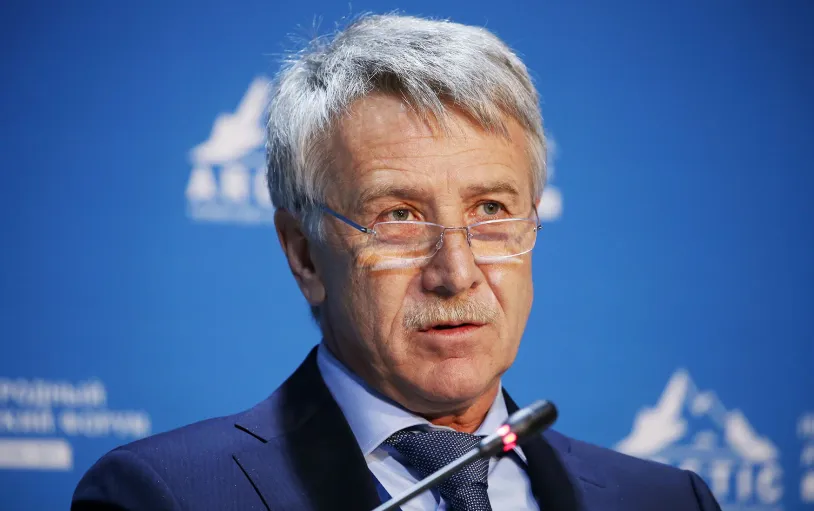Both the monopolist and the consumers are dissatisfied with the tariff regulation. According to Vladimir Lisin, the owner of NLMK, it is not up to the antimonopoly authority to regulate prices “at the corners,” without taking into account other factors. But the final decision will be made by the government.
Transneft head Nikolai Tokarev, Novatek CEO Leonid Mikhelson #4 and NLMK board chairman Vladimir Lisin #1 recently asked the government to transfer authority for tariff regulation from the Federal Antimonopoly Service (FAS) to the Ministry of Economic Development.
In their letter, Tokarev and two of Russia’s richest men point out that “at present there is a situation in which, due to a lack of coordinated approaches on the above issues, decisions necessary for the development of infrastructure companies and, consequently, individual industries, are not being made.” According to the signatories, the lack of systemic decisions on tariff regulation does not allow industry companies to plan their activities, which leads to a decrease in the level of investment in critical infrastructure and limits the growth of the entire Russian economy.
The authors of the appeal are noteworthy: Transneft, Novatek and NLMK. If Transneft belongs to the subject of natural monopoly (and tariffs for oil transportation services are approved by FAS), the activities of Novatek and NLMK are not subject to tariff regulation, they act as consumers of monopoly services. This includes tariffs for oil and gas transportation, tariffs for electric power transmission services, and tariffs for railway transportation services. Thus, a paradoxical situation developed in which both the monopolist and the consumers became dissatisfied with tariff regulation at the same time. And the case when it came to an appeal to the government is exceptional.
There are serious reasons for the emergence of such ideas. The Federal Antimonopoly Service took over the powers of the tariff regulator at the time of the crisis of the tariff regulation system, which was characterized by the following features:
Lack of long-term predictability and comprehensiveness of regulation: inconsistency of approaches to determining the growth rate of tariffs at the federal level with the methods by which tariffs are calculated. Low quality of normative-legal field (variability, contradictions, ambiguous interpretations, errors in methodologies). Emphasis on control over spending, rather than on creating incentives to improve the efficiency of regulated companies. Poor quality of the information environment of regulation (disclosure of a large amount of information without the ability to assess its reliability).
Over the last three years, during which the FAS has been carrying out the functions of tariff regulation, no qualitative solution of these problems has been outlined. The main efforts of the regulator were reduced to the declaration of a rather simple for perception approach “inflation minus”, which began to be massively promoted without serious analysis of the industry specifics and the situation in specific companies. This approach was often realized in contradiction to the approved methodology of tariff formation. The draft law on state regulation of prices (tariffs) initiated by the Federal Antimonopoly Service drew sharp criticism from both monopolists and consumers.
It is worth mentioning that before it was decided to abolish the Federal Tariff Service and transfer its powers to the FAS, the Government’s Expert Council had been working for a few years to improve the system of regulation of the natural monopolies. Four models were considered: to improve the existing system on the basis of FTS, to merge FAS and FTS, to create several branch regulators or a single inter-branch regulator. A clear choice in favor of any model was not made.
If you look at foreign experience, in most countries (almost all European countries and the USA) the functions of tariff regulation of natural monopolies are concentrated in a separate independent agency. But decisions are made collegially: taking into account the opinions of other interested ministries and departments. This way the balance of interests of different parties is maintained.
Will the proposal of Transneft, Novatek and NLMK help improve the situation? On the one hand, if we proceed from the priorities of the macroeconomic policy, the analysis of the mutual influence of the industries and the influence of the tariff policy on the consumers’ competitiveness, then of course this work is closer to the Ministry of Economic Development. On the other hand, if it is necessary to correlate pricing policy with the priorities of development of regulated infrastructure industries, then this is an argument in favor of giving relevant powers to industry ministries (Ministry of Energy, Ministry of Transport, Ministry of Construction and Housing).
In any case, this will not lead to a coordinated policy on prices and tariffs. The fact is that when any existing agency is vested with the authority of a tariff regulator, there is inevitably a temptation to subordinate tariff formation to the logic of traditional departmental competencies, which in the end will only lead to distortions and aggravation of the above-mentioned problems, growth of claims of the participants of the regulatory process and degradation of the regulation system itself.
One thing is obvious: state regulation of tariffs requires special competences and resources in order to conduct a balanced and effective tariff policy, ensuring a balance between the interests of producers and consumers. Unfortunately, after the liquidation of FTS, almost all the personnel potential was lost (less than 10% of FTS staff was transferred to FAS), which will take years to be replenished.
The transfer of tariff regulation functions to the Ministry of Economic Development will not be the solution of all problems. It is hoped that this situation will serve as a pretext for the government to reconsider the significance of the system of state tariff regulation and to take decisions as to its further architecture. The Federal Antimonopoly Service, in its turn, should concentrate its efforts on creating a real competitive environment and energy markets, which, ultimately, should lead to lower costs for consumers and higher efficiency of natural monopolies.
